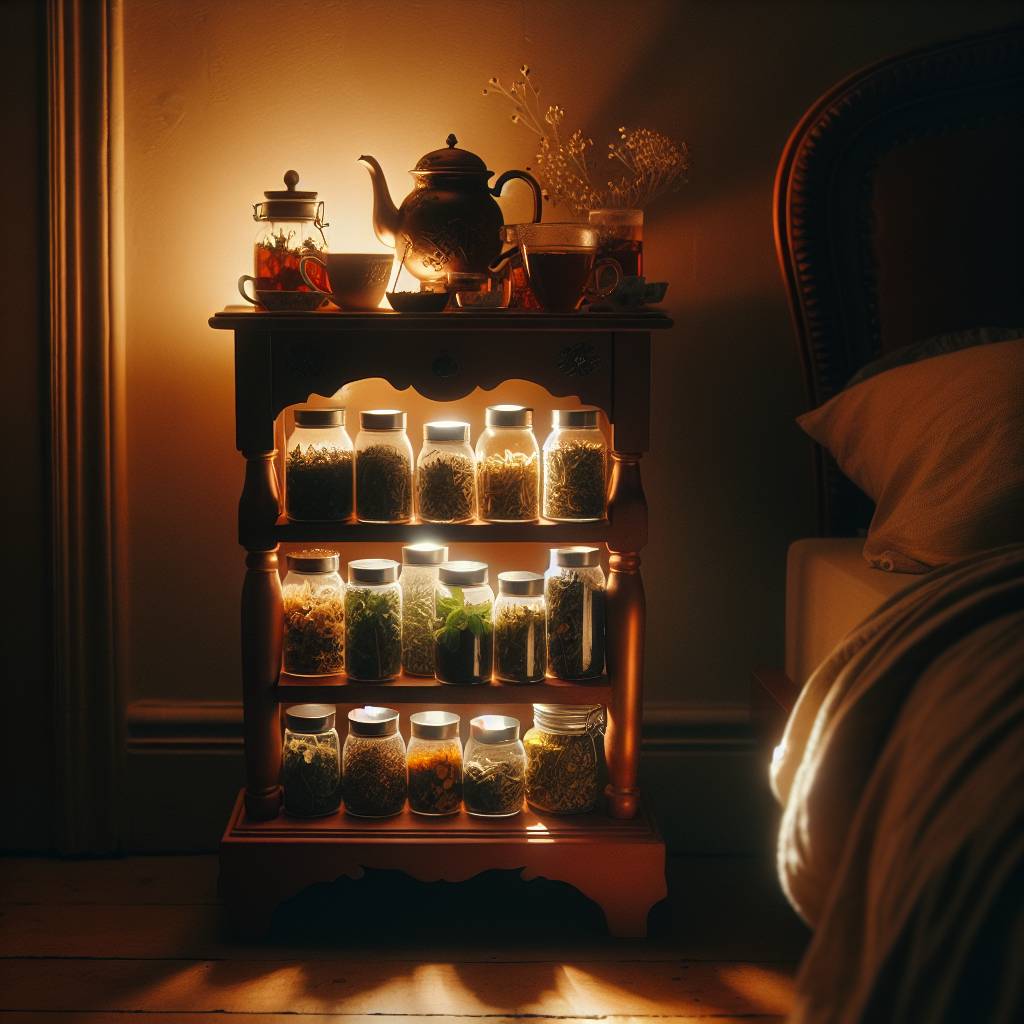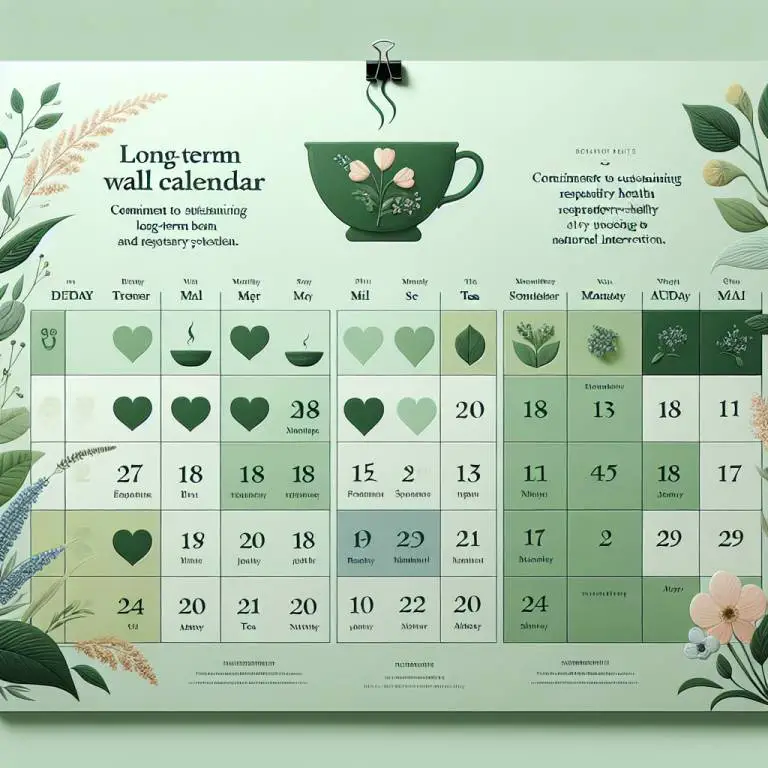Drinking herbal teas before bed: Can it reduce nighttime asthma symptoms?
Drinking certain herbal teas before bed can help reduce nighttime asthma symptoms, offering a better sleep experience for those with nocturnal asthma. Teas like ginger, peppermint, and chamomile are known for their anti-inflammatory properties that may ease breathing difficulties. By incorporating these teas into your nightly routine, you might find relief from asthma symptoms and enjoy a more restful night.

Drinking herbal teas before bed: Can it reduce nighttime asthma symptoms?
Many people with asthma find that their symptoms get worse at night. This can make it hard to sleep and affect their overall quality of life. Some have started turning to natural remedies, like drinking herbal teas before bed, as a way to ease these nighttime asthma symptoms.
Herbal teas are known for their calming and soothing properties. They have been used for centuries to help with various health issues. For those with asthma, certain herbal teas might offer relief by relaxing the airways, reducing inflammation, or helping clear mucus from the lungs.
What types of herbal teas are most effective for easing asthma symptoms?
Ginger tea is one popular choice among people looking for natural ways to manage their asthma symptoms. Ginger has anti-inflammatory properties that can help reduce airway inflammation. Another good option is peppermint tea, which contains menthol. Menthol can help relax the muscles in the airways, making breathing easier.
Chamomile tea is also recommended for its anti-inflammatory and antioxidant properties. It can help soothe the body and may reduce allergic reactions that can trigger asthma attacks at night. Each of these teas offers different benefits, so trying a few different types might be helpful to see what works best for an individual’s specific symptoms.
Uncover the best teas for asthma relief. Learn about their healing properties and preparation tips.
How do specific ingredients in herbal teas work to alleviate respiratory issues?
The ingredients found in certain herbal teas act on the body in ways that can directly impact respiratory health. For example, ginger contains compounds like gingerols and shogaols that have been shown to reduce inflammation in the airways. This reduction in inflammation can lead to less tightness and wheezing in people with asthma.
Menthol from peppermint tea works by relaxing the smooth muscles of the airways. This relaxation opens up the airways, making it easier to breathe. Chamomile contains flavonoids that may act as natural antihistamines, helping to reduce allergic reactions that often worsen asthma symptoms at night.
Are there any scientific studies supporting the use of herbal tea for asthma relief?
While there is a wealth of anecdotal evidence suggesting that herbal teas can help manage asthma symptoms, scientific research on this topic is still emerging. Some studies have looked into the anti-inflammatory and antioxidant effects of certain herbs like ginger and chamomile on respiratory health.
However, more targeted research is needed to fully understand how these natural remedies interact with asthma specifically during nighttime hours. Despite this need for more study, many healthcare professionals support using herbal teas as part of a broader approach to managing asthma due to their general health benefits and low risk of side effects when used appropriately.
What is the best time to drink herbal tea for managing nocturnal asthma symptoms?
To maximize the potential benefits of herbal tea for nocturnal asthma relief, timing plays a crucial role. Drinking a cup of herbal tea about 30 minutes before bedtime may give your body enough time to absorb its beneficial properties while preparing you for sleep.
This timing not only helps in potentially easing respiratory issues but also contributes to establishing a calming bedtime routine which itself can improve sleep quality—important for everyone but especially beneficial for those dealing with chronic conditions like asthma.
| Herbal Tea | Potential Benefits for Asthma |
|---|---|
| Ginger Tea | May help reduce inflammation and relax airways. |
| Peppermint Tea | Possibly relieves congestion and opens up airways. |
| Chamomile Tea | Could potentially soothe muscles in the airways, reducing asthma symptoms. |
| Green Tea | Might have anti-inflammatory effects that help with respiratory issues. |
| Licorice Root Tea | May ease breathing problems by reducing bronchial spasms. |
| Turmeric Tea | Potentially reduces inflammation related to asthma symptoms. |
| Eucalyptus Tea | Might improve breathing and reduce coughing by clearing nasal passages. |
| Fennel Tea | Could have expectorant properties, helping clear mucus from the airways. |
Can drinking herbal teas interact with conventional asthma medications?
When considering herbal teas as a supplement for asthma management, it’s important to understand their interaction with prescribed medications. Some herbs can either enhance or inhibit the effectiveness of conventional asthma drugs. This means that while some herbal teas might offer relief, they could also interfere with your medication’s ability to control asthma symptoms.
For instance, certain herbal ingredients might increase the risk of side effects when taken alongside specific asthma medications. It’s always best to consult with a healthcare provider before adding herbal teas to your routine, especially if you’re on prescription asthma treatments. They can advise on which herbs are safe to use and which ones to avoid.
What are the potential side effects of using herbal teas for asthma management?
While many people find herbal teas beneficial for managing nocturnal asthma symptoms, there are potential side effects to be aware of. Some individuals may experience allergic reactions to certain herbs, which could worsen asthma symptoms instead of alleviating them. Symptoms of an allergic reaction can include itching, swelling, and difficulty breathing.
Additionally, overconsumption of certain herbs in tea form can lead to other health issues such as nausea, headaches, or digestive problems. It’s crucial to follow recommended dosages and listen to your body’s response when incorporating herbal teas into your nighttime routine for asthma management.
How can someone with nocturnal asthma incorporate herbal teas into their bedtime routine for maximum benefit?
Incorporating herbal teas into a bedtime routine for those with nocturnal asthma can be quite simple and beneficial. Start by selecting an herbal tea known for its respiratory benefits—such as ginger, peppermint, or chamomile tea. Drinking a warm cup of this tea about 30 minutes before bed can help soothe the airways and reduce inflammation.
Maintaining consistency is key; make drinking the tea a nightly ritual for the best results. Additionally, ensure your sleeping environment is conducive to good respiratory health by keeping it clean and free from allergens that could trigger symptoms during the night.
Are there other natural remedies or practices that can complement the use of herbal teas for better asthma control at night?
Beyond drinking herbal teas, incorporating other natural remedies and practices into your nighttime routine can further aid in controlling nocturnal asthma symptoms. Practices such as using a humidifier in your bedroom can keep air moist and help prevent airway dryness that might trigger an attack. Also, gentle yoga or breathing exercises before bed can relax the muscles around the airways and improve lung function.
Eating a balanced diet rich in anti-inflammatory foods like fruits, vegetables, whole grains, and omega-3 fatty acids also supports overall respiratory health. Avoiding known allergens and irritants within your home environment is crucial too; this includes dust mites, pet dander, smoke, and strong fragrances.
Final Thoughts
Incorporating herbal teas into one’s bedtime routine could offer additional support in managing nocturnal asthma symptoms alongside conventional treatments. However, it’s essential to proceed with caution due to possible interactions with medications and potential side effects.
By consulting healthcare professionals and combining these natural remedies with other healthy lifestyle practices—like maintaining a clean sleeping environment—you can create a comprehensive approach towards better controlling your asthma at night.






